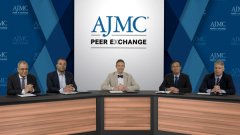
Clinical Pathways and Streamlined Decision-Making in HCC Management
Benefits of clinical pathway implementation in HCC management are examined.
Episodes in this series

In this segment of the panel discussion, the focus was on the importance of data in clinical pathways for treating hepatocellular carcinoma (HCC) patients. Richard Kim, MD, highlighted the need to assess the impact of clinical pathways on patient care, emphasizing the relevance of the existing evidence. While acknowledging the effectiveness of clinical pathways, he also pointed out the potential conflict between prioritizing clinical outcomes and patient-centered care. The need for regular reviews of the pathways to ensure their relevance and the challenges of implementing them in various health care systems due to resource limitations were also discussed.
Following this, Martin F. Dietrich, MD, PhD, emphasized the importance of clinical pathways as an aid for decision-making rather than a rigid prescription tool. He stressed the complexities of the decision-making process, especially with the rapid developments in the field of HCC treatment. The challenge of choosing between various first-line immunotherapy-based regimens and the need for effective screening measures were highlighted. The panelists discussed the significance of clinical pathways in maintaining a checklist for quality care, ensuring that crucial elements are not overlooked in the busy setting of community practice. Additionally, they discussed the cost-effectiveness aspect, emphasizing the need to balance efficacy and safety with the overall cost of care. While acknowledging the benefits of clinical pathways, they underscored the fact that these pathways should complement the physician’s expertise and not replace it, especially in the complex realm of HCC treatment. The segment concluded with a recognition of the multifaceted nature of hepatocellular carcinoma and the need for a holistic approach in its management.
The panelists also touched upon the challenges faced by larger centers and community oncology sites in maintaining the balance between standardization and personalized care. They emphasized the importance of supporting medical oncologist generalists in their decision-making processes and the significance of patient education through structured communication based on clinical pathways. They highlighted the role of clinical pathways in optimizing available resources, ensuring timely intervention, and potentially enhancing overall survival rates for patients with HCC.
Video synopsis is AI-generated and reviewed by AJMC editorial staff.
Newsletter
Stay ahead of policy, cost, and value—subscribe to AJMC for expert insights at the intersection of clinical care and health economics.










